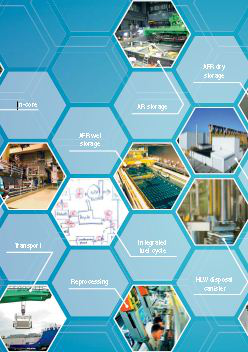Speaker
Dr
Surik Bznuni
(Nuclear and Radiation Safety Center, Armenia)
Description
Currently two main approaches are applied to demonstrate criticality safety of spent fuel in the Back-End of the Fuel Cycle: fresh fuel approach and burnup credit approach. In the fresh fuel approach, spent nuclear fuel has a pre-known precise nuclide composition that enables to develop bounding approach to the criticality safety analysis in the Back-End of the Fuel Cycle. This approach assures conservativeness of the analysis with respect to criticality safety, however, it limits the storage/cask capacity or upper limit of enrichment of the fuel assemblies to be loaded in the storage/cask.
Burnup credit approach allows to dispose of above mentioned limitations, however, it requires knowledge of isotopic composition of spent fuel as a function of burnup and irradiation history with high degree of confidence. To get a desired confidence extensive verification and validation activities based on chemical assay analysis are needed. Usually chemical assay data represent cuts from several axial positions of certain fuel rods, therefore 3D depletion analytical capabilities are required to carry out full scope verification and validation activities.
This paper discusses results of the assessment of 3D depletion capabilities of MCNP6.1 code based on WWER-440 fuel chemical assay data.
Country/ int. organization
Nuclear and Radiation Safety Center of Armenian Nuclear Regulatory Authority
Primary author
Dr
Surik Bznuni
(Nuclear and Radiation Safety Center, Armenia)
Co-authors
Mr
Armen Amirjanyan
(Nuclear and Radiation Safety Center, Armenia)
Mr
Jack Ramsey
(US Nuclear Regulatory Comission, USA)
Mr
Nairi Bagdasaryan
(Nuclear and Radiation Safety Center, Armenia)
Dr
Peter Kohut
(Brookhaven National Laboratory, USA)

